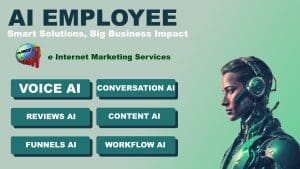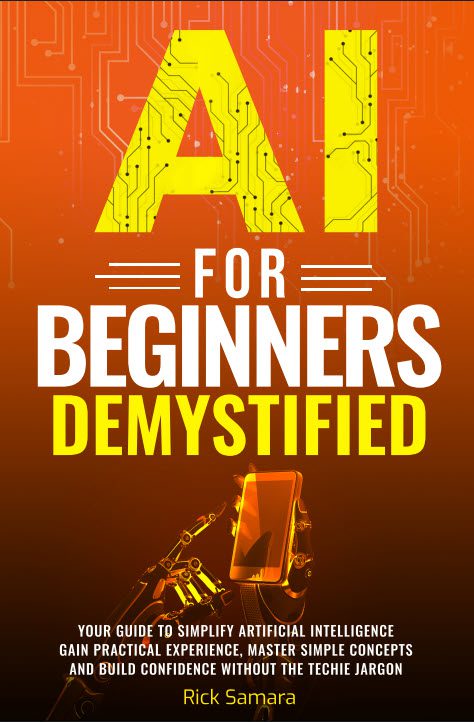Are you a small business owner feeling overwhelmed by the constant buzz around Artificial Intelligence (AI)? Do you struggle to understand how it can actually improve your efficiency and boost your bottom line? You’re not alone! Many small business owners find the world of AI complex and intimidating. But what if AI wasn’t so scary after all? What if it could be your secret weapon for success?
 At E Internet Marketing Services, we’re committed to helping small businesses thrive in the digital age. That’s why we’re excited to announce our new “AI for Beginners” series, featuring newsletters, podcasts, and webinars designed to demystify AI and make it accessible to everyone. And to kick things off, we’re providing a simplified overview of AI, drawing from the book “AI for Beginners Demystified” by Rick Samara. We’ll be highlighting key concepts from Chapters 1, 3, and 7, focusing on practical applications for your business. No prior tech knowledge is needed – we promise!
At E Internet Marketing Services, we’re committed to helping small businesses thrive in the digital age. That’s why we’re excited to announce our new “AI for Beginners” series, featuring newsletters, podcasts, and webinars designed to demystify AI and make it accessible to everyone. And to kick things off, we’re providing a simplified overview of AI, drawing from the book “AI for Beginners Demystified” by Rick Samara. We’ll be highlighting key concepts from Chapters 1, 3, and 7, focusing on practical applications for your business. No prior tech knowledge is needed – we promise!
What is AI and Why Should Small Businesses Care?
Demystifying AI: A Simple Definition
So, what exactly *is* AI? In simple terms, AI is the simulation of human intelligence by machines. It enables computers to perform tasks that typically require human intelligence, such as understanding language, recognizing patterns, and making decisions. Think of it as teaching a computer to “think” like a human.
You’re already interacting with AI in your everyday life. Your smartphone uses AI for facial recognition, spam filtering, and voice assistants like Siri and Google Assistant. Recommendation systems on platforms like Netflix and Amazon also leverage AI to suggest products or movies you might like.
AI: Not Just for Big Corporations
 AI isn’t just for tech giants anymore. It’s increasingly relevant and beneficial for small businesses like yours. According to recent research, only about 25% of small and businesses use AI solutions in some capacity. AI can help you increase efficiency, improve customer service, and make better decisions, ultimately leading to increased profitability.
AI isn’t just for tech giants anymore. It’s increasingly relevant and beneficial for small businesses like yours. According to recent research, only about 25% of small and businesses use AI solutions in some capacity. AI can help you increase efficiency, improve customer service, and make better decisions, ultimately leading to increased profitability.
 The benefits are compelling: research shows that AI delivers an average of **$3.50 in returns for every dollar invested** [3], with businesses saving an average of **$7,500 annually**, and **25% of adopters saving over $20,000** [3]. Organizations leveraging AI for marketing and sales report **80% revenue growth and 20% cost reductions** [3].
The benefits are compelling: research shows that AI delivers an average of **$3.50 in returns for every dollar invested** [3], with businesses saving an average of **$7,500 annually**, and **25% of adopters saving over $20,000** [3]. Organizations leveraging AI for marketing and sales report **80% revenue growth and 20% cost reductions** [3].
Book Summary: “AI for Beginners Demystified”
A Quick Tour of the Book
“AI for Beginners Demystified” aims to simplify complex AI concepts and provide practical guidance for beginners. The book breaks down AI into manageable components, using relatable examples and personal stories to make the topic more accessible. The author, Rick Samara, draws on his experience as an Intelligence Analyst in the U.S. Air Force and owner of an internet marketing company to explain AI in plain English.
Key Themes Covered in the Book
The book covers a range of topics, including:
- Overcoming skepticism and misconceptions about AI
- Understanding the core components of AI (machine learning, neural networks, deep learning, and Generative AI)
- Exploring practical AI tools and applications in everyday life
- Ethical considerations in AI development and deployment
Chapter Highlights: Focus on Practical Applications
Chapter 1: Roadblocks to AI – Overcoming Skepticism
 Chapter 1 addresses common fears and misconceptions about AI, such as job displacement and complexity. It emphasizes that AI is a tool to *help*, not *replace*, employees. Just as automobiles and computers revolutionized industries in the past, AI is poised to transform businesses in the present. It’s crucial to embrace continuous learning and adaptation to thrive in this new landscape.
Chapter 1 addresses common fears and misconceptions about AI, such as job displacement and complexity. It emphasizes that AI is a tool to *help*, not *replace*, employees. Just as automobiles and computers revolutionized industries in the past, AI is poised to transform businesses in the present. It’s crucial to embrace continuous learning and adaptation to thrive in this new landscape.
Remember the skepticism surrounding the introduction of automobiles? People worried about safety and job losses. However, automobiles eventually became symbols of modernization and personal freedom. Similarly, computers were initially met with resistance, but they ultimately transformed our world and ushered in the Information Age [50]. AI is following a similar trajectory.
Chapter 3: Artificial Intelligence (AI): It’s Moving Parts
Chapter 3 explains the core components of AI in simple terms. It uses analogies to make the concepts more understandable. Think of machine learning as teaching someone to bake by allowing them to experiment with ingredients until they perfect the recipe. It’s about observing patterns and making decisions based on data rather than pre-set rules.
The chapter also introduces *Generative AI*, which focuses on using our nested dolls to generate content! This includes writing stories, articles, and even books. It can generate pictures, images, and videos from nothing, and it can also produce music. These systems rely heavily on neural networks, which you already know are designed to imitate how our brains work.
Chapter 7: The Magical World of Prompts
Chapter 7 delves into the art of crafting effective prompts for AI tools like ChatGPT. Prompts are the messages or instructions you give to AI to get a desired response. The chapter introduces the “3-Word Rule” for crafting effective prompts. For example, if you want a straightforward response that anyone can understand, add “like I’m 10 years old.” If you want a technical response, add “like an engineer.”
The chapter also explains how to create “Smart Prompts” by providing detailed context and instructions to the AI. For example, instead of asking for a complete marketing plan in a single prompt, break it down into smaller steps: audience analysis, messaging strategies, channel recommendations, and tactical implementation details.
Remember, it’s crucial to verify the accuracy of AI-generated content. AI systems can produce plausible-sounding but incorrect information, requiring human review before accepting outputs as factual [30].
Taking the Next Steps with AI
Practical Tips for Getting Started
Ready to dive in? Here are some actionable steps you can take:
- Try out a free AI tool like ChatGPT, Google Gemini, or Ideogram to familiarize yourself with its capabilities [10].
- Identify a specific problem in your business that AI could potentially solve (e.g., automating customer service inquiries, personalizing marketing emails, optimizing inventory management).
- Start with a small pilot project to test the effectiveness of AI in addressing that problem [42].
Resources for Continued Learning
- Elements of AI: A free online course designed for non-experts [25].
- Google AI: Offers beginner courses, such as “AI Essentials” and “Introduction to Generative AI” [28].
- AI Automation Agency Facebook Group: Ideal for creators, marketers, business owners, automation lovers, and beginners.
- Consider pursuing AI certifications to demonstrate your expertise and enhance your career prospects [49].
E Internet Marketing Services: Your Partner in AI Adoption
How We Can Help Your Business
At E Internet Marketing Services, we offer a range of AI-related services to help small businesses like yours leverage the power of AI. Our services include:
- AI-powered marketing automation
- AI-driven content creation
- AI-enhanced customer service solutions
- AI-optimized website design
We focus on delivering tangible benefits, such as increased efficiency, improved marketing ROI, and enhanced customer engagement. Contact us today for a free consultation to discuss how AI can transform your business!
Addendum: AI For Business – Time to Get On Board?
AI tools are now accessible to small businesses, enabling them to enhance operational efficiency by automating manual tasks, streamlining workflows, and leveraging real-time data analysis to make quicker and more informed decisions. That’s right, there are similarities between what large corporations and small businesses need.
 We recognize that the world of AI often feels overwhelming and complicated. To address this, we’ve teamed up with the well-known SaaS provider, High Level, to offer a thorough, unbiased, and actionable AI solution. Along with EIMS, you’re leading this revolution with our advanced AI tool, AI Employee, which helps sales teams work smarter, not harder.
We recognize that the world of AI often feels overwhelming and complicated. To address this, we’ve teamed up with the well-known SaaS provider, High Level, to offer a thorough, unbiased, and actionable AI solution. Along with EIMS, you’re leading this revolution with our advanced AI tool, AI Employee, which helps sales teams work smarter, not harder.
Conclusion
AI is no longer a futuristic fantasy – it’s a present-day reality that’s accessible, beneficial, and requires ongoing learning. Don’t let fear or complexity hold you back. Embrace AI, explore its potential, and empower your business to thrive in the age of intelligent technology. Remember to prioritize ethical considerations and responsible AI deployment.
The future is intelligent. Are you ready?
[54] Adopting AI for Small Businesses: Key Challenges and Best Practices
[3] AI ROI Metrics for Small Businesses
[50] Unleash the AI Revolution: How Today’s Tech Compares to Historic Innovations
[10] Myths About AI in Small Businesses
[42] Step-by-Step Guide to Implementing AI in Your Small Business
[25] Elements of AI
[49] The Future of Learning and Development: Adapting to an AI-Powered World
## Sources and References
- New Advocacy Article Highlights Small Businesses Closing the AI Adoption Gap
- AI Usage in the SMB Workplace Study
- AI ROI Metrics for Small Businesses
- Beyond Efficiency: Small Businesses Look to AI for Competitive Edge
- Superagency in the Workplace: Empowering People to Unlock AI’s Full Potential
- AI Will Shape the Future of Marketing
- 7 Myths Holding Back Business AI Adoption
- Businesses Embracing AI but Staff Fears of Job Losses Remain
- AI Tools for Startups and Small Businesses
- Myths About AI and Small Businesses
- New Data Show No AI Jobs Apocalypse—For Now
- AI and the Small Business Guide
- Neural Networks: A Beginner’s Guide
- Generative AI (IBM Think)
- The 3-Word Rule That Makes ChatGPT Give Expert-Level Responses
- AI vs Deep Learning vs Machine Learning: A Beginner’s Guide
- What Is Generative AI?
- Use This 3-Word Rule to Get Smarter Answers from ChatGPT
- Case Study: Small Businesses Winning with AI Tools (2025)
- AI Automation Examples
- Companies That Use AI-Generated Customer Support
- AI-Powered Success: 1,000 Stories of Customer Transformation
- Artificial Intelligence in Business
- Examples of AI in Customer Service
- Elements of AI
- Best AI Courses for Small Business Owners
- Best AI Tools for Teachers (Facebook Groups)
- Google AI Learning Hub
- Grow Your Business with Google
- AI and the Small Business Guide
- Securing AI: Addressing Security Risks for Small Businesses
- Building a Responsible AI Framework: 5 Key Principles
- Ethical Considerations of AI
- AI and Data Privacy (IBM Think)
- How to Implement AI Responsibly
- Future of Artificial Intelligence: Key Technology Trends
- 2025 and the Next Chapters of AI (Google Cloud)
- PwC AI Predictions Report
- AI Automation Trends: 2024 Insights & 2025 Outlook
- The Future of AI
- Step-by-Step Guide to Implementing AI in Your Small Business
- AI and Business Strategy
- Gen AI KPIs: Measuring AI Success (Deep Dive)
- AI for Small Business (Salesforce)
- Stanford 2025 AI Index Report
- HU Professor’s Book Unlocks the Mysteries of Machine Learning
- The Future of Learning & Development in an AI-Powered World
- Unleash the AI Revolution: Comparing Today’s Tech to Historic Innovations
- AI for Beginners: Demystified (Goodreads)
- How to Keep Up with AI Through Reskilling
- AI and the Industrial Revolution (Columbia Business)
- Adopting AI for Small Businesses: Challenges and Best Practices
- SME AI Adoption in 2025: Key Insights from OECD Research
- Overcoming AI Implementation Challenges
- AI for Small Business (Next Insurance)
- Global Trends (USC4AM)
- From Hesitancy to Implementation: A Step-by-Step AI Guide for SMBs


